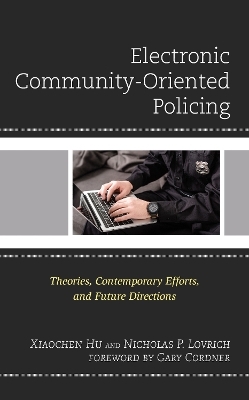
Electronic Community-Oriented Policing
Lexington Books (Verlag)
978-1-7936-0786-7 (ISBN)
Hu and Lovrich introduce the "electronic community-oriented policing (E-COP)," concept to explore how social media can impact police strategies on improving and maintaining police-public relation. Using empirical evidence and theoretical foundations, this book demonstrates the importance of this timely refinement to traditional community-oriented policing strategies as we move further into the twentieth century. E-COP represents a systematic approach to policing that applies knowledge derived from theories of individual behavior, social behavior, and mass communication dynamics to contemporary policing practice. This book would be of interest to policing researchers, scholars, and students as well as police practitioners wishing to improve their use of social media resources to connect to the public they serve in the digital age.
Xiaochen Hu is assistant professor in the Department of Criminal Justice at Fayetteville State University. Nicholas P. Lovrich is Regents professor emeritus and Claudius O. and Mary W. Johnson distinguished professor of political science at Washington State University.
Part I: Police, Media, and New Media
Chapter 1: Media, the Criminal Justice System, and the Police
Chapter 2: New Media and Police
Part II: Conceptualization of Electronic Community-Oriented Policing: Theoretical Foundations
Chapter 3: Theories on Individual, Social, Mass Communication, and Organizational Behavior
Chapter 4: Community-Oriented Policing and the President’s Task Force on 21st Century Policing
Chapter 5: Electronic Community-Oriented Policing: Core Concepts and Strategies
Part III: Contemporary Electronic Community-Oriented Policing Efforts
Chapter 6: What Do the Police Do on Social Media?
Chapter 7: Public Preferences Regarding Police Use of Social Media
Chapter 8: Outliers: Facebook Posts That Received Extraordinary Public Attention
Chapter 9: Case Study: Small Police Agency Use of Facebook
Part IV: Future Directions
Chapter 10: Improving Electronic Community-Oriented Policing
Chapter 11: Implementing and Evaluating Electronic Community-Oriented Policing
Conclusion and Future Research: Computer Science, Police Research, and Social Media
| Erscheinungsdatum | 06.08.2021 |
|---|---|
| Reihe/Serie | Policing Perspectives and Challenges in the Twenty-First Century |
| Vorwort | Gary Cordner |
| Verlagsort | Lanham, MD |
| Sprache | englisch |
| Maße | 153 x 231 mm |
| Gewicht | 408 g |
| Themenwelt | Recht / Steuern ► Strafrecht ► Kriminologie |
| Sozialwissenschaften ► Kommunikation / Medien ► Kommunikationswissenschaft | |
| ISBN-10 | 1-7936-0786-9 / 1793607869 |
| ISBN-13 | 978-1-7936-0786-7 / 9781793607867 |
| Zustand | Neuware |
| Haben Sie eine Frage zum Produkt? |
aus dem Bereich


